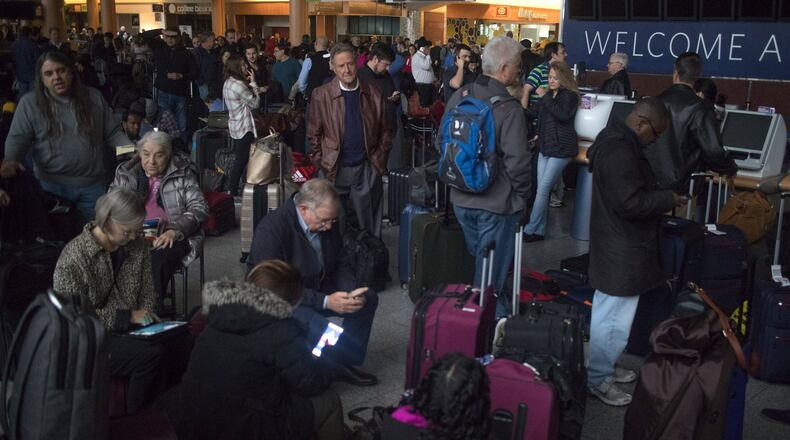A month and a half after Atlanta's Hartsfield-Jackson Airport experienced a massive power outage resulting from a fire at its underground power supply, Georgia Power says it has not established the root cause.
The fire which occurred in an underground tunnel that runs cables that supply power to the main terminal, concourses and the plane train disrupted operations during the busiest travel season. Power delivery to the Control Tower and the North Airfield Lighting vault was also affected.
It took fire fighters from the City of Atlanta four hours to extinguish the fire that Georgia Power said started at the underground tunnel near Concourse E.
In written responses to questions by regulators at the Georgia Public Service Commission on how the company handled the event from initial notification, the company said it was conduction investigations and would provide the commissioners with the analysis once complete. The company estimates repairs would cost $230,000.
Georgia Power said visual inspections of the underground cables and switches was last conducted a month before the incident. The underground system was installed between 1985 and 1988 and the company said it conducts visual and infrared inspections on the equipment at the tunnel every 12 to 18 months.
According to Georgia Power there have been no reports of fire damage to the underground network systems in the last ten years.
Approximately 1,100 flights were cancelled during the outage that affected approximately 30,000 travellers during the peak holiday travel season.
Reese McCranie, Director of Policy and Communications at the Atlanta Hartsfield-Jackson International Airport said normal flights resumed early Monday morning, while power was restored less than twelve hours after the outage began.
According to a timeline Georgia Power provided to the commissioners, the company’s first crew member arrived at the airport an hour after receiving first notification of the situation.
The company declined to provide detailed system information, inspection and maintanance procedures to the commission claiming that kind of information was trade secret and its release could jeorpadize the company’s business and reveal valuable information to those seeking to do harm to the company’s electric structure at the airport.
"Competitors of the company are not required to disclose similar information and to require the company to do so would put it in an economic disadvantage," the company said.
Here are some of the answers the company provided to the commissioners questions.
Question: Would the effect of this event been minimized if Hartsfield-Jackson had a functional microgrid system that included thermal energy sources, renewable energy and energy storage technologies?
Response: Whether the effect of this would have been minimized depends on the design of any standby power application or any on-site generation and electrical system components. The reliability of it was related to a loss of utility power to the terminals…It is important to note that this particular event was not related to a shortage of generation.
Question: If a new redundant circuit is proposed to be installed, please provide the detailed cost estimate and timeline for installing such a system.
Response: Georgia Power currently has not made such a proposal…The Airport Airlines Terminal Corporation (AATC) and the City of Atlanta will be involved in determining whether any additional steps should be taken to enhance the reliability of the electric system at the airport.
Question: What steps does the company propose to prevent this event from recurring?
Response: Georgia Power is in the process of conducting a thorough investigation into the cause of the December 17, 2017 airport outage and will determine the appropriate path forward based on the results of the investigation.
Question: Will Georgia Power be taking further cybersecurity/critical infrastructure security measures for the airport now that this vulnerability has been exposed?
Response: At this time, Georgia Power has not identified any cybersecurity or critical infrastructure security vulnerability."
The company said it would work with the City of Atlanta and the AATC to determine whether it could make the electric system at the airport even more reliable. The process may include consideration of enhancements to cybersecurity and critical infrastructure security measures.
The Atlanta Journal-Constitution reviewed the timeline Georgia Power provided PSC commissioners on how events unfolded after being notified of a problem at one of the Airport’s Substations.
Time activity
Sunday 17th, 2017
- 12:09 pm: Georgia Power notified of a breaker trip at substation A
- 12:51 pm: Georgia Power notified that two airport substation breakers have tripped. Power is out at the Main terminal and concourses A-D
- 12:55 pm-1:15 pm: Georgia Power dispatches network supervisors, test engineers and crews
- 12:56 pm-12:59 pm: Georgia power learns that 4 additional substations on terminal A have tripped. Power outage reported in the main terminal, concourses A-F, the trains, Control Tower, North Airfield Landing Vault.
- 1:15 pm: First Georgia Power employee arrives at the Airport
- 2:00 pm-3.00 pm: Problem location identified by GA power employees and City of Atlanta Fire department. Crews determine fire in underground tunnel near Concourse E.
- 4:00 pm-4:50 pm: Fire is extinguished.
- 4:50 pm: Georgia Power engineers enter the tunnel, assess damage and determine multiple sets of cables and two switches damaged.
- 5:00 pm: Georgia Power begins to isolate damaged cables
- 6:51 pm: Power restored to concourse F
- 11:51 pm: Power restored at Main Terminal and Concourse A-E
Monday 18th
- 8:05 am: Power restored to the control tower and the North Airfield Lighting Vault
- 9:27 am: Power restored to the trains
Friday 22nd
- Network underground system fully restored
More from AJC reporter, Anastaciah Ondieki:
» Trump tariff on solar imports gets mixed reaction in Georgia
» Power still out in Puerto Rico; Southern Company sends more crews
About the Author
Keep Reading
The Latest
Featured



